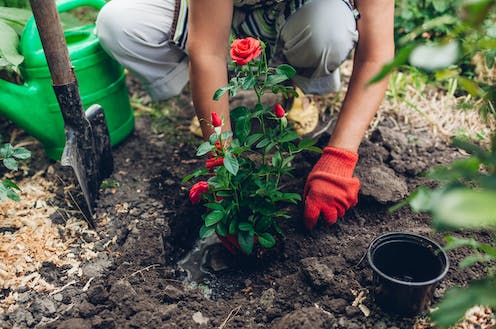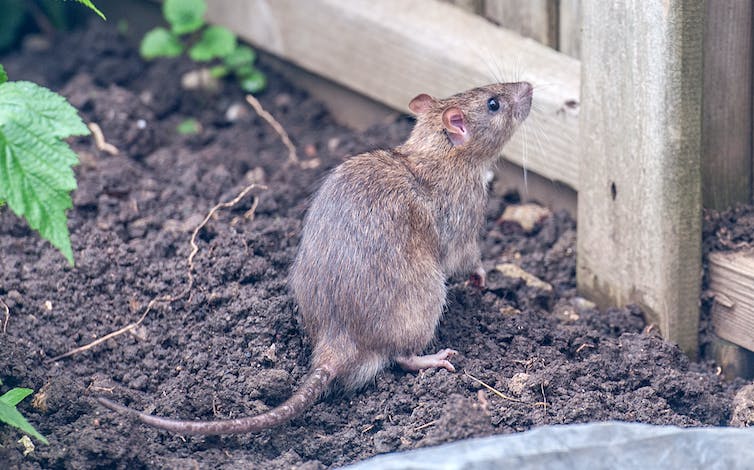
Many people see gardening as a relaxing pastime – an easygoing way to spend hours outdoors when the weather’s nice. But as a consultant in emergency medicine, I deal with all manner of medical emergencies and injuries arising from what may appear to be a harmless hobby.
Over the years, I have seen hand wounds from cutting implements and foot wounds from lawn mowers and garden forks. In recent weeks, I have seen falls from ladders, head wounds from falls on concrete – and, sadly, confirmed the death of a person in their later years whose enthusiastic shovelling proved too much.
Even in times past, the garden could be quite the health hazard. One of the first patients to be treated with penicillin was a police officer who had apparently contracted sepsis after a scratch from a rose thorn. In those days, the most minor of wounds could have the deadliest of consequences – and it turns out this can still happen, with a UK woman recently dying from sepsis after scratching her hand while gardening.
But these aren’t the only dangers lurking in your garden. Here are just a few things to look out for before you next head out to tend your plants:
Table of Contents
1. Tetanus
Tetanus is a particularly nasty disease. The muscles go into spasm due to the effects of the toxin from the bacteria, Clostridium tetani. The suffering is almost indescribable, causing painful muscle spasms and a locked jaw.
Many associate tetanus with objects such as rusty nails. But this surprisingly common organism is also found in the soil, particularly if manured, because clostidia are found in the gut. Roses like soil with manure, so this could turn these beloved flowers deadly if you get cut by contaminated thorns or if the soil gets into a cut.
Luckily, I have yet to see any cases in the emergency room because the UK immunises against tetanus. And I never want to see a case, because of how nasty it is. The case fatality rate can exceed 50% in people who aren’t immunised. This is why it’s important to check that your tetanus jab is up to date.
2. Bacteria and fungi
Lurking in a humble bag of compost is an ingredient many of us wouldn’t expect: Legionella.
This bacteria can cause an infection called Legionnaires’ disease which is particularly harmful for the elderly and people with a compromised immune system. It can lead to a nasty and often fatal pneumonia when inhaled. Warm, stagnant water involved in the composting process may account for its presence.
It isn’t only pre-packaged compost that’s hazardous. Your own compost heap is also be filled with various bacteria and fungi, which, if properly maintained, should cause you no trouble. But often the mould Aspergillus can grow when it’s hot outside. This can give rise to some nasty lung lesions and may even become more widespread in the body – especially in the elderly and immunosuppressed and can be fatal.
Mould spores can also trigger allergies in some people, a condition known as extrinsic allergic alveolitis or “farmer’s lung”. This condition was classically due to exposure to mouldy hay, but compost heaps can also do the same because of the presence of organisms such as Aspergillus and the bacteria Actinomycetes.
3. Leptospirosis
Leptospira is a bacterium that may be found in water contaminated with rat urine. With rats often building habitats near humans, it might be best to take care near the pond or rainwater barrels when gardening.

battybattrick/ Shutterstock
Leptospira can cause leptospirosis, a rather unpleasant infection that causes headaches, fevers, chills, vomiting, jaundice and then later, liver failure, kidney failure and meninigitis.
4. Power tools
While power tools can make our work easier in the garden, they can also make it much easier to injure ourselves, too. Hedge trimmers may be a great way to tame trees and bushes, but they can also amputate digits and inflict wounds very efficiently. Be sure to wait until the hedge trimmer is fully turned off before clearing any branches you’ve removed.
Hedge trimmers and lawn mowers can also easily cut through electric cables, which can lead to electrocution. Power tools can also be disastrous if you fall while up a ladder and if you have power lines crossing your garden, then please avoid them.
Stay safe
While these hidden dangers are certainly a risk, luckily there are many simple things you can do to avoid harm from them, including:
-
Cleaning and covering wounds while gardening.
-
Make sure your immunisations are up to date (especially for tetanus).
-
Keeping compost bags away from your face when you open them.
-
Deter rats by not putting cooked food on compost heaps, covering water butts and setting up traps if you have an infestation.
-
Set up ladders firmly on even ground away from power lines.
-
Enjoy having wildlife but leave it alone (snakes can be just as much a danger as rats).
And one last piece of advice from me. Every year the burns unit at my hospital sees a number of people who have tried to speed up the process of lighting their barbecue or bonfire by using petrol. Not all survive. So if you are planning to cook the fruits of your labours on a barbecue in your garden, make sure you don’t use inflammable liquids to get the flame started, and have a fire extinguisher on hand just in case.
Gardening is a rewarding hobby that has many health benefits. Just be sure to take sensible precautions.
![]()
Stephen Hughes does not work for, consult, own shares in or receive funding from any company or organisation that would benefit from this article, and has disclosed no relevant affiliations beyond their academic appointment.
























